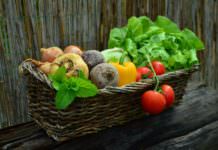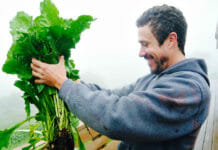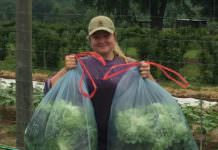 There’s been a lot of buzz this past week about Wal-Mart turning its buying focus on local and sustainable foods (see the New York Times article). It’s easy to take a position against the megastore retailer, but it’s more interesting to consider the implications more fairly. Here’s what Erin Barnett, director of LocalHarvest.org has to say on the topic in their latest newsletter. I like in particular her thoughts in the last paragraph about what eating and buying local means in a deeper way. What do you think?
There’s been a lot of buzz this past week about Wal-Mart turning its buying focus on local and sustainable foods (see the New York Times article). It’s easy to take a position against the megastore retailer, but it’s more interesting to consider the implications more fairly. Here’s what Erin Barnett, director of LocalHarvest.org has to say on the topic in their latest newsletter. I like in particular her thoughts in the last paragraph about what eating and buying local means in a deeper way. What do you think?
On one hand, the thought of Walmart sticking its gigantic foot in the local food door seems potentially ruinous. The company is known for setting extremely low prices with its suppliers, and the margins on real food are already achingly slim. Would contracts with Walmart actually help farmers, or ultimately hurt them?
On the other hand, Walmart is going to get its apples and broccoli and onions from somewhere. It might as well be close to home, with some type of sustainable practices. Decentralizing food production is a good idea. If the planet’s biggest grocer turns sustained attention toward buying a significant amount of local food (which, according to the Times, they define as within the state) they could do a great deal to encourage the establishment and growth of mid-sized farms across the country. That would be a good thing.
Walmart may be able to procure foods grown within certain geographic boundaries, but for many of us, local food means more than that. For me, “local food” is a kind of shorthand for an entire ethic. In this ethic, food is produced under quality conditions, on a scale that feels human rather than corporate, by people whose focus is on natural resource stewardship as much as it is on the bottom line, in a business whose owners do right by their employees. On the consumer side of this ethic, the food is purchased, prepared and eaten with awareness of its true value.
All week I have been thinking about what single word would capture the feeling behind this ideal. The word I came up with was ‘kindness’. In my estimation, there is a broad, radical kindness that underlies the emerging alternative food economy, which ultimately is an economy based on relationship. It is hard for me to imagine that kindness and relationships are at the heart of the megastore’s buy local campaign. But it is also hard for me to imagine a future without grocery store chains. I fully expect that the groundswell of support for authentic food and small farmers will continue to grow and flourish. If, alongside it, the nation’s grocers begin engaging local farmers in their response to consumer demand for higher quality food, and if farmers are able to get fair prices, that would also be a good thing.










![What we’re reading [Oct 16 2017]](https://www.buckscountytaste.com/wp-content/uploads/2017/10/coffee_macbook_reading_pexels-photo-414630-218x150.jpeg)

It does make me a little uneasy to think about wally-world stepping into local provider circles, but ultimately I think it’s a positive thing because of the attention it brings to the local scene. Just the fact that Walmart is prepared to go forward with a local strategy will drive others to do the same and hopefully consumers to think more about buying local.